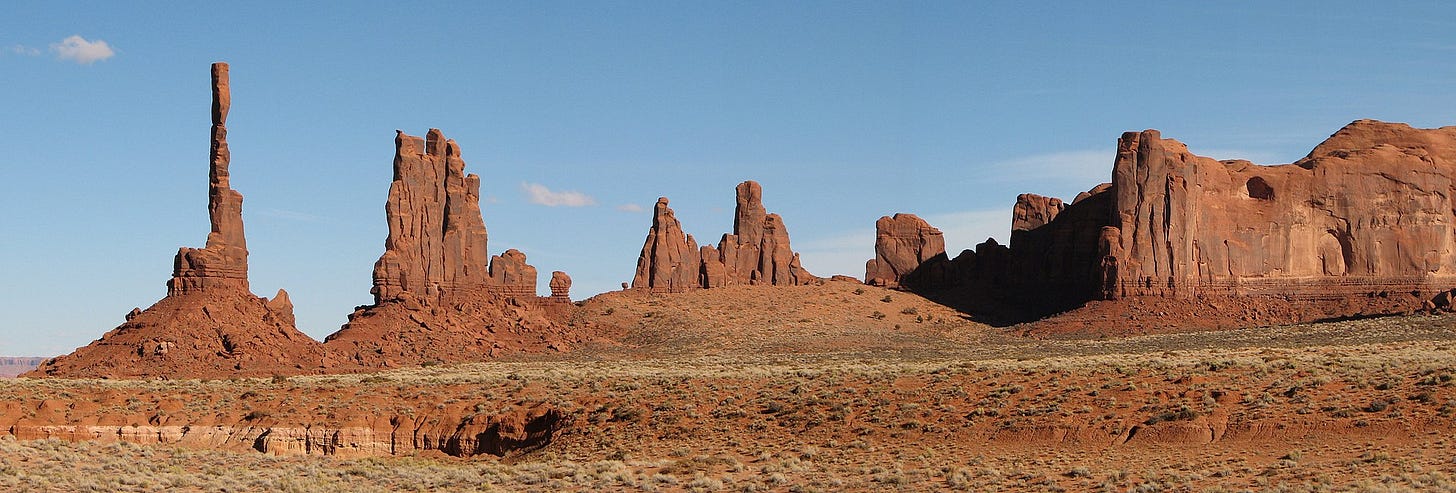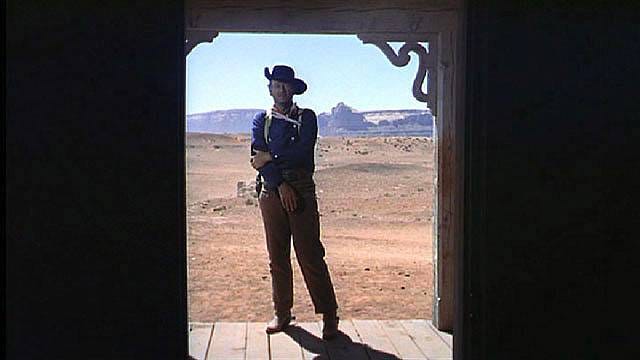Ethan Edwards's America
And the American Myth of the Blood
It was the film New York magazine called “the most influential movie in American history.”1 It is regarded as John Wayne and John Ford’s greatest Western, and it is without question my favorite. And it is an occasion to remind us of one foundational truth about this country: we have always been in race wars. Contained in this country are two rival Americas, deeply in tension with each other.
The film’s plot follows ex-Confederate and filibuster Ethan Edwards, who has returned to his brother’s family on the Texas frontier, after a long absence in his quest to rescue his brother’s kidnapped daughter Debbie. Debbie’s part-Cherokee adopted brother Martin Pawley tags along. The two of them hunt for the girl for five years before safely returning her to her family.
The film’s enduring fame lies primarily in its honest depiction of rival Americas, the two Americas that together defined the soul of this country from the earliest days of Puritans and Cavaliers well into the 20th century. Martin Pawley is honest, lovable, forgiving, and capable, but also stubborn. As the years of the search drag on, he begs Ethan Edwards not to kill Debbie, which Edwards intends to do, stating that she has become “the leavins of a Comanche buck.”
Unlike so many Hollywood films that give a rose-tinted view of the Indian wars, The Searchers (1956) hints at the brutal realities of this conflict. Women were taken as sex slaves. Children who were too young to steal had their heads dashed against rocks until their brains spilled out. Given the time this film was made, it obviously doesn’t depict this, but the historical accounts describe this phenomenon over and over again.2 A woman taken by the Comanche was thus unquestionably spoiled, and it was not just Ethan Edwards who felt this way. “Ethan will put a bullet in her brain. I tell you Martha would want him to,” Martin tells us in disgust. In many cases, the captive women, even if rescued, never truly returned to the life they had lived before the brutality inflicted on them. Martin represents an America that would sooner forget the whole thing, and so is incapable of understanding Ethan Edwards.
The ex-Confederate, ex-Texas Ranger burns as the example of the other America, the America we would all sooner forget. A savage, unapologetically racist, and hard America, but an America no less embodied by this country, whose specter still makes the woke shy away from the Star-Spangled Banner. Ethan Edwards dearly loves his family, his brother, his brother’s wife (who, it is heavily implied, is as in love with him as he is with her), his brother’s family, and his people. Ethan Edwards risks his life almost pathologically for his niece, for the memories of who she was, and seeks to kill her not out of some cartoon villain hate, but the deep love he had for an unspoiled girl who should have been allowed a normal, wholesome life. Savage America is no less idealistic than Civilized America, and in service of its idealism, the Americans conquered this continent, piece by piece.
The film is everything its cheap spaghetti Western imitations could never be — a story of American heroism amidst American savagery. Knitted together, the two Americas embark on an epic quest, an American Odyssey, driven by wildly different loves, which have the same object. The Searchers may have contributed to the death of the Western, in that it perfectly completed it, a magnum opus that could never be matched. In the minds of the Ellis Islanders and foreigners who made films like the Dollars Trilogy, the savagery was just meaningless brutality, almost comical inhumanity, and tells us in absolute terms that there was nothing particularly great about manifest destiny. The Searchers has the daring to depict not only the savagery but also the love and idealism that conquered this continent, and in so doing earns its moniker of American Odyssey.
And what of the two Americas? Well, their fates were reflected in the ending of the film, with one receiving a hero’s welcome, received into the arms of the beautiful blonde-haired fiancée, and the other left outside in the cold, to be forgotten lest civilized America be confronted with the part of them without which this empire, and this people, would not exist.
And yet, not all of us have forgotten Ethan Edwards and his America. We here at the Old Glory Club never will, and if we succeed, neither will you.
https://www.rogerebert.com/reviews/great-movie-the-searchers-1956
Glenn Frankel, The Searchers: The Making of an American Legend (Bloomsbury USA: 2013), p. 41.




Absolutely. How quickly we forget. America wasn't colonized, it was conquered. The landmass was the enemy. The bleakness, the size, the rattle snakes. How did they even raise kids in that kind of place?
But when your main worries in life are getting your triple cream frapuccino before work or booking a botox appointment then you have space in your civilized life to agonize over one-sided takes on history while worrying about the weather in 2100. So much for the civilized post-Ethan Edwards phase.